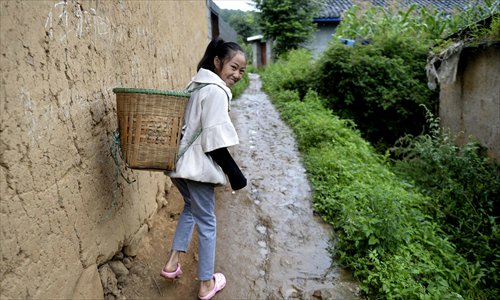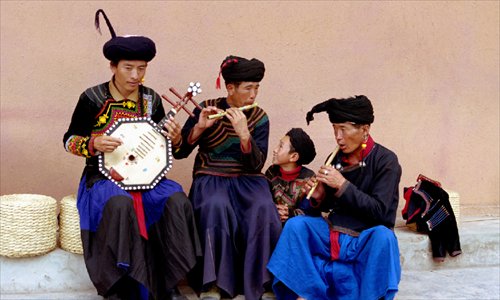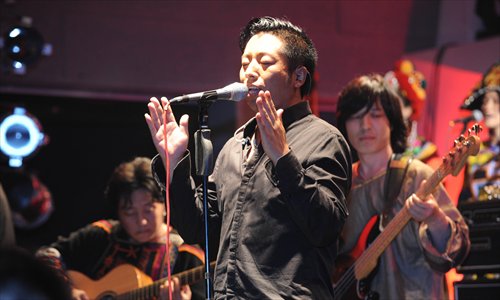Rocker-turned-official gives a boost to community grappling with poverty, AIDS
Former singer Enzhaluoge gave up the rock and roll lifestyle to become a civil servant in his Yi ethnic minority village on Liangshan mountain, one of the poorest areas in China. The region has a history of drug abuse and AIDS, and due to these issues many children living there are orphans. Aside from his professional duties, Enzhaluoge has been teaching children how to sing, hoping this may help provide them a way out of the mountains, but it's proven to be a difficult path.

An Yi girl carries a basket in her village in Liangshan Yi Autonomous Prefecture, Sichuan Province. Photo: CFP
Thirty-seven-year-old rock and roll singer Enzhaluoge has been deputy secretary of Ani village for six years now.
For seven years he sung in bars in Chengdu, Sichuan Province and was quite well-known in the city's rock and roll scene. But now, the only part of his day related to his old life is when he teaches children how to sing, hoping that music will help them travel to the outside world.
Ani is located in Liangshan Yi Autonomous Prefecture in Sichuan, one of the poorest places in China. The prefecture is close to the "golden triangle" opium-producing area in Southeast Asia and Southeast China's Yunnan Province. The local government said that more than 55,000 people of the prefecture's 4.73 million people were infected with HIV in 2013. In the past, media reported on the drug and AIDS issues there, and many children orphaned by these problems are left in grinding poverty.
Enzhaluoge hopes the children there can use music as a way to find work or even fame in the outside world, but even though some people from Liangshan have been successful, this road is difficult and the chance of success is not high.

Yi singing band Eagles. Photos: CFP
Coming back
Enzhaluoge became an official by chance. His younger brother died in 2009, the seventh year he was singing in Chengdu. There was nobody to take care of his mother and he had to come home.
To support them, he took the test to become a civil servant at his village.
Ani has a population of around 800 people and they are all Yi. Liangshan is the place where the density of Yi people is highest, and they make up 49.13 percent. Out of the 3,733 villages in Liangshan, 2,561 are under national poverty line in terms of per capita income.
The village is on a mountain 2,600 meters above sea level. Almost all the young men from the village are working away from the mountain, leaving only women, children and the elderly, as well as some animals at home. Almost all the women in the village have to care for multiple children.
Dejingu, a 17-year-old, is one of the few women to have a job outside the village. She started working in Dongguan, Guangdong Province at an early age. But she told Southern Weekly that she'll eventually come back to the village.
"You get married, have children, and live your life, isn't that how it's supposed to be?" she told Southern Weekly.
Enzhaluoge found his job isn't easy and he needed to incorporate the traditions of his ethnicity into his methods of management.
Once, a road was being built in the village and the planned route went through a household's cemetery. During construction, the family tried to stop the project.
When Enzhaluoge went to the scene to negotiate with the family, he found the family felt their ancestors had not been respected and wanted to hire a priest to perform a ritual for the souls of their ancestors. In the end, Enzhaluoge did as they wished.
There are many stories of things like this happening in the village. Enzhaluoge prefers not to talk about them.
"It takes time to change the situation gradually," he told Southern Weekly.

Yi fok musicians. Photo: IC
Singing a way out
Under these circumstances, Enzhaluoge felt that he should teach the children how to sing.
The education on offer to children in Liangshan's Yi ethnic areas is poor, with even the data on the area having fallen behind the times. At the end of 2000, the proportion of the population who had received the nine years of education that is compulsory in China was just 29.4 percent.
Many children in Ani come from poor backgrounds. The village's elementary school starts classes at 9:30 in the morning and dismisses them at 3 pm, because some children need to walk for over an hour in order to attend.
Enzhaluoge, looking for a way to make a difference, now teaches them to sing and play traditional instruments he made by hand. Sometimes he teaches them popular songs, sometimes songs he wrote himself. It's not only because he loves music. He thinks the Yi people have a talent for singing and can use this as a way to succeed in the outside world.
The example many young Yi people are seeking to replicate is the Eagles, a group made up of three Yi men. In 1993, they became popular and many people got to know of the Yi people and Liangshan because of them.
Jikequbu, the founder of the Eagles, used to work in a mine. Because he was lonely and felt that he had no clear future, he wrote an Yi-language song called "Missing Mother."
After the song became popular in Yi areas, Jikequbu thought he might have an opportunity to travel outside the mountains.
In 1993, he founded the Eagles and went to live in Guangdong. They sang in a mixture of Putonghua and the Yi language and achieved a moderate degree of mainstream success. Some say that in Liangshan, every driver has at least two tapes of the Eagles.
Inspired by the band's success, many young people from Liangshan began dreaming of careers in music. In 1996, a Yi band made up of two brothers became popular. They didn't quite make it to Beijing, but they became famous in Chengdu, and it gave people back home some hope they can change their lives and at least live in a modern way.
"I wanted to sing and become famous so badly back then," Ajianigu, another Yi singer who was born in 1983 told the Southern Weekly. "If you become famous, people will respect you, and that feels so good."
He told Southern Weekly that according to Yi traditions, those who are obsessed with singing are usually seen as lazy people who can't mind their own business, which is why if one gets into show business, one hopes to make it to the top.
He went to college in Xichang, capital Liangshan prefecture, and during that time, he imitated the Eagles and recorded some songs he wrote organized a band on campus as well.

Yi singer Waqiyishe. Photo: CFP
Long road
But that road isn't necessarily any easier for people from Liangshan.
Ajianigu went to the bars in Guangzhou, capital of Guangdong with his band after college. But after a few months, he felt homesick.
"These big cities are too complicated, I don't know anybody there, nor do I have money, how can I make a living?" he told Southern Weekly. Soon enough, he returned to Xichang, where he had a job at a tourism agency right after college.
The same thing happened with the Eagles, they had trouble getting used to city life, from the food, language, to small details like chewing with one's mouth shut.
"In the mountains, we usually chew loudly, if you didn't make a sound, your father would hit your head with a chopstick and say you're a sissy," the Eagles' Jikequbu said. But while in Guangzhou, they were often asked by their agent to chew more quietly, otherwise it's considered rude.
Moreover, it's difficult to stay famous, even though right now the impression young people of Liangshan have is it's easy to become popular, especially as another wave of Yi singers have become famous through talent shows in the last couple of years.
Enzhaluoge sometimes thinks about the outside. Even though life at home is much more comfortable and relaxing than being pressured in the big cities, he feels the outside has more temptations and he can see that having an influence on his peers in the villages.
"They are too eager for quick success," Enzhaluoge told Southern Weekly. "Many young people can't even sing in the Yi language. When we were young, we could sing more than 400 Yi folk songs."
This is something he stresses when he teaches children how to sing.
"You need to learn your language first, and your ethnic songs. There are so many people who can sing in Putonghua and in English, why should you do it also?" he often tells the children.
Southern Weekly
Newspaper headline: Mountain folk